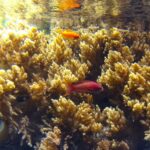A new study from iBB-Institute for Bioengineering and Biosciences and Departamento de Bioengenharia at Instituto Superior Técnico was published today in the 𝐉𝐨𝐮𝐫𝐧𝐚𝐥 𝐨𝐟 𝐅𝐮𝐧𝐠𝐢.
𝑴. 𝒈𝒂𝒅𝒊𝒕𝒂𝒏𝒂 is utilized as feed in aquaculture and considered one of the most promising microalgae species for industrial co-production of high-value products.
The article reports the characterization of the culturable yeast population present during the scale-up process of 𝑴. 𝒈𝒂𝒅𝒊𝒕𝒂𝒏𝒂 cultivation at PhytoBloom – Microalgae by Necton facilities, from 5 L flasks until 27,000 L Tubular Photobioreactors. The culture was followed for three months to isolate and molecularly identify the associated yeast population.
The 146 isolates obtained belong to the species 𝘙𝘩𝘰𝘥𝘰𝘵𝘰𝘳𝘶𝘭𝘢 𝘥𝘪𝘰𝘣𝘰𝘷𝘢𝘵𝘢, 𝘙. 𝘮𝘶𝘤𝘪𝘭𝘢𝘨𝘪𝘯𝘰𝘴𝘢, 𝘙. 𝘵𝘢𝘪𝘸𝘢𝘯𝘦𝘯𝘴𝘪𝘴, 𝘙. 𝘴𝘱𝘩𝘢𝘦𝘳𝘰𝘤𝘢𝘳𝘱𝘢, 𝘝𝘪𝘴𝘩𝘯𝘪𝘢𝘤𝘰𝘻𝘺𝘮𝘢 𝘤𝘢𝘳𝘯𝘦𝘴𝘤𝘦𝘯𝘴, 𝘔𝘰𝘦𝘴𝘻𝘪𝘰𝘮𝘺𝘤𝘦𝘴 𝘢𝘱𝘩𝘪𝘥𝘪𝘴, 𝘢𝘯𝘥 𝘔𝘦𝘺𝘦𝘳𝘰𝘻𝘺𝘮𝘢 𝘨𝘶𝘪𝘭𝘭𝘪𝘦𝘳𝘮𝘰𝘯𝘥𝘪𝘪. A systematic screening of their capacity to accumulate lipids and produce biosurfactants was also performed.
Results indicate that these isolates are promising for yeast biotechnological applications and the study microalgae–yeasts interactions
This research was carried out within the scope of “𝐏𝐚𝐜𝐭𝐨 𝐝𝐚 𝐁𝐢𝐨𝐞𝐜𝐨𝐧𝐨𝐦𝐢𝐚 𝐚𝐳𝐮𝐥” (WP5 Algae Vertical and WP9 Biobanco Azul Português) and was funded by Next_Generation_EU European Fund and the 𝐏𝐨𝐫𝐭𝐮𝐠𝐮𝐞𝐬𝐞 𝐑𝐞𝐜𝐨𝐯𝐞𝐫𝐲 𝐚𝐧𝐝 𝐑𝐞𝐬𝐢𝐥𝐢𝐞𝐧𝐜𝐞 𝐏𝐥𝐚𝐧 (PRR).
This work was performed in close collaboration with PhytoBloom – Microalgae by Necton to uncover culturable_yeast diversity associated with the industrial cultivation of the oleaginous microalgae 𝑴𝒊𝒄𝒓𝒐𝒄𝒉𝒍𝒐𝒓𝒐𝒑𝒔𝒊𝒔 𝒈𝒂𝒅𝒊𝒕𝒂𝒏𝒂, produced at Necton facilities (Olhão, Portugal).
The work, led by Prof. Isabel Sá-Correia at the iBB-Biological Sciences Research Group (BSRG), has as the two first authors Madalena Matos and Mónica Fernandes. This interinstitutional study also involved Inês Costa and Natacha Coelho from Necton, and Tamára Santos, Veronica Rossetto and João Varela from Centre of Marine Sciences (CCMAR), University of Algarve.
👉 Link to research: https://lnkd.in/duKD-RUN



